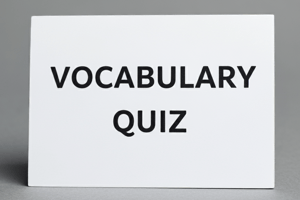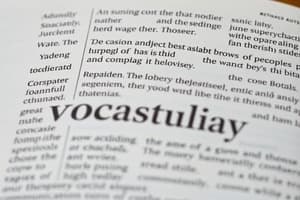Podcast
Questions and Answers
What does the term 'petrified' mean in the context of fear?
What does the term 'petrified' mean in the context of fear?
- To be extremely scared (correct)
- To be casually excited
- To feel indifferent
- To be mildly worried
How does Mark approach his daily routine according to the content?
How does Mark approach his daily routine according to the content?
- He leaves everything to chance each morning
- He is meticulous and orchestrates his morning routine (correct)
- He wakes up at the same time every day without a plan
- He uses a random schedule for his tasks
What is the purpose of using the phrase 'the alarm rings' instead of 'I wake up'?
What is the purpose of using the phrase 'the alarm rings' instead of 'I wake up'?
- To emphasize the time of day exclusively
- To confuse the listener
- To imply that waking up is a negative experience
- To sound more advanced and descriptive (correct)
What does 'courageous' imply about someone's actions?
What does 'courageous' imply about someone's actions?
What does the term 'precision' mean in the context of Mark's routine?
What does the term 'precision' mean in the context of Mark's routine?
Which of the following best describes the tone of Mark's morning routine as presented?
Which of the following best describes the tone of Mark's morning routine as presented?
Which vocabulary word used to describe decision-making also implies bravery?
Which vocabulary word used to describe decision-making also implies bravery?
What does saying 'my alarm rings' imply about Mark's viewpoint?
What does saying 'my alarm rings' imply about Mark's viewpoint?
What is the structure of the sentence 'As I prepare my breakfast, I review my back-to-back meetings'?
What is the structure of the sentence 'As I prepare my breakfast, I review my back-to-back meetings'?
Which phrase indicates a situation where all parties benefit?
Which phrase indicates a situation where all parties benefit?
What does 'I could ask what are your thoughts on this?' imply?
What does 'I could ask what are your thoughts on this?' imply?
What is the purpose of the phrase 'let's circle back to that later'?
What is the purpose of the phrase 'let's circle back to that later'?
What does 'we need to prioritize our tasks' mean?
What does 'we need to prioritize our tasks' mean?
What does the phrase 'keep me in the loop' express?
What does the phrase 'keep me in the loop' express?
What is meant by 'thinking outside the box'?
What is meant by 'thinking outside the box'?
Which phrase would you use to express strong disagreement?
Which phrase would you use to express strong disagreement?
What does it mean to 'iron out the details'?
What does it mean to 'iron out the details'?
When is it appropriate to use the phrase 'I'm all ears'?
When is it appropriate to use the phrase 'I'm all ears'?
Which phrase suggests pausing to reflect on a decision?
Which phrase suggests pausing to reflect on a decision?
Which of the following phrases can be used to express agreement with a proposal?
Which of the following phrases can be used to express agreement with a proposal?
The phrase 'I could say' is generally used to indicate what?
The phrase 'I could say' is generally used to indicate what?
What is the primary context for using the phrase 'let’s get started'?
What is the primary context for using the phrase 'let’s get started'?
What is a natural response when someone asks, 'How's it going?'
What is a natural response when someone asks, 'How's it going?'
What phrase can be used to show appreciation instead of saying 'thank you'?
What phrase can be used to show appreciation instead of saying 'thank you'?
How can you politely decline an offer for something?
How can you politely decline an offer for something?
Which phrase would you likely use to offer help to someone?
Which phrase would you likely use to offer help to someone?
What is an appropriate response when someone says 'Long time no see'?
What is an appropriate response when someone says 'Long time no see'?
Which phrase signifies a casual invitation to socialize?
Which phrase signifies a casual invitation to socialize?
How can you ask someone about their weekend plans?
How can you ask someone about their weekend plans?
What is a common way to say goodbye informally?
What is a common way to say goodbye informally?
When you want to ask for assistance, which expression is typically used?
When you want to ask for assistance, which expression is typically used?
Which phrase is used as a casual way to indicate willingness to help?
Which phrase is used as a casual way to indicate willingness to help?
What does the verb 'orchestrates' primarily mean in the context of daily routines?
What does the verb 'orchestrates' primarily mean in the context of daily routines?
How is the phrase 'to be filled with' best interpreted in this context?
How is the phrase 'to be filled with' best interpreted in this context?
Which of the following best describes the term 'back-to-back' as used in this context?
Which of the following best describes the term 'back-to-back' as used in this context?
What does the expression 'races against the clock' imply in daily routines?
What does the expression 'races against the clock' imply in daily routines?
What does 'cherishes the moments of connection' suggest about Mark's feelings towards his children?
What does 'cherishes the moments of connection' suggest about Mark's feelings towards his children?
What is the meaning of the word 'integral' as used in this context?
What is the meaning of the word 'integral' as used in this context?
How does Mark conclude his daily routine according to the passage?
How does Mark conclude his daily routine according to the passage?
What does 'savors the tranquility' imply about Mark's state of mind before bed?
What does 'savors the tranquility' imply about Mark's state of mind before bed?
What effect does using 'complex sentences' have on communication?
What effect does using 'complex sentences' have on communication?
Which phrase could replace 'slips into' for a more basic expression?
Which phrase could replace 'slips into' for a more basic expression?
What is the implication of describing children's activities as 'extracurricular'?
What is the implication of describing children's activities as 'extracurricular'?
Which of the following phrases denotes a more advanced way to express 'after dinner'?
Which of the following phrases denotes a more advanced way to express 'after dinner'?
In this context, what does the verb 'carves out' signify when referring to Mark's routine?
In this context, what does the verb 'carves out' signify when referring to Mark's routine?
When it is said that 'Mark excels in conveying intricate ideas', what does 'excels' mean in this scenario?
When it is said that 'Mark excels in conveying intricate ideas', what does 'excels' mean in this scenario?
What does the phrase 'I beg to differ' signify in a conversation?
What does the phrase 'I beg to differ' signify in a conversation?
When should you use the expression 'cut to the chase'?
When should you use the expression 'cut to the chase'?
What does 'the ball is in your court' imply?
What does 'the ball is in your court' imply?
To 'nip something in the bud' means to:
To 'nip something in the bud' means to:
What does saying 'it's not my cup of tea' suggest?
What does saying 'it's not my cup of tea' suggest?
Using 'they hammered out the agreement' suggests that:
Using 'they hammered out the agreement' suggests that:
When someone says 'I'm tied up', what does it mean?
When someone says 'I'm tied up', what does it mean?
What is the implication of saying 'let's put our heads together'?
What is the implication of saying 'let's put our heads together'?
To 'play devil's advocate' means to:
To 'play devil's advocate' means to:
What does 'run it by the team first' advise?
What does 'run it by the team first' advise?
Why would one say 'I need to think long term'?
Why would one say 'I need to think long term'?
What does the phrase 'we're swamped' mean?
What does the phrase 'we're swamped' mean?
Using 'I'll take that into consideration' suggests you will:
Using 'I'll take that into consideration' suggests you will:
The expression 'How's it going?' is commonly used as:
The expression 'How's it going?' is commonly used as:
Flashcards are hidden until you start studying
Study Notes
Professional Phrases
- I'm on board with that - Expresses agreement or support for a suggestion or idea
- Are we on the same page? - Confirms everyone has the same understanding, opinion, or viewpoint
- It's a win-win situation - A situation where all parties benefit
- What are your thoughts on this? - Requests someone's opinion or feedback
- We need to think outside the box - Encourages creative and innovative thinking to solve problems
- Let's circle back to that later - Postpones discussion for later
- We need to prioritize our tasks - Organizes tasks based on importance and urgency
- Please keep me in the loop - Requests information or updates be shared
- Have they ironed out the details? - Asks if something has been resolved or clarified
- I'm all ears - Expresses openness and willingness to listen
- Let's take a step back - Pauses to review a situation or decision
- I beg to differ - Expresses disagreement with someone's opinion or statement
- I'll cut to the chase - States the main point directly, without small talk or additional details
- Run it by the team first - Shares ideas for feedback and approval
- Frank calls the shots - Indicates someone is in charge and has the authority to make decisions
- The ball is in Frank's court - Indicates it's someone else's responsibility to make a decision
- We need to nip this in the bud - Stops a problem at the early stages before it becomes more serious
- It's not my cup of tea - Expresses dislike for something
- They hammered out the agreement - Indicates something is finalized, usually with agreements, proposals, or contracts
- We're swamped right now - Indicates being very busy
- We'll take that into consideration - Indicates willingness to consider someone's feedback, suggestion, advice, or recommendation
- We need to think long term - Emphasizes importance of considering future implications
- Sorry, I'm tied up - Indicates being busy and therefore unavailable
- Let's put our heads together - Suggests collaboration, brainstorming, or gathering multiple opinions
- To play devil's advocate - Considers opposing viewpoints when making a decision
Daily Speech Phrases
- How's it going? - Casual greeting used with friends, colleagues, or family members
- Catch you later - Informal way to say goodbye, implies seeing the person again soon
- What's up? - Informal greeting, similar to "How are you?"
- No problem - Informal way to say "You're welcome"
- I'm good, thanks - Common response to "How are you?"
- How are things? - A polite way to inquire about someone's well-being
- Not bad - Informal response to "How are you?", indicating one is okay, but not great
- See ya - Informal way to say goodbye, often used with friends
- Take care - A friendly way to say goodbye, implying concern for someone's well-being
- Have a good one - Informal farewell, wishing someone a pleasant time
- Cheers - Informal way to say "Thank you" in some contexts, often used in British English
- Hang in there - Encourages someone to stay positive and persevere
- No worries - Informal way to say "Don't worry"
- Sounds good - Expresses agreement or acceptance of a suggestion
- Absolutely - Strong agreement with a statement or suggestion
- Totally - Informal way to express strong agreement
- Let's do it - Expresses excitement or willingness to participate
- That's awesome - Expresses excitement or enthusiasm
- That's a bummer - Expresses disappointment or regret
- I can't believe it - Expresses surprise or disbelief
- What a drag - Expresses annoyance or disappointment
- Good for you - Congratulates someone on an accomplishment
- That's cool - Expresses approval or interest
- That's crazy - Expresses amusement or disbelief
- What a mess - Expresses disapproval or frustration
- That's interesting - Shows curiosity or interest
- It's a long story - Indicates that explaining something will take a long time
- It's a good thing - Indicates that something is fortunate
- You're kidding - Expresses disbelief or surprise
- That's priceless - Indicates something is valuable or memorable
- What a coincidence - Highlights the unexpected similarity between two events
- Easy peasy - Indicates something is simple and straightforward
- Piece of cake - Indicates something is easy to do
- No sweat - Indicates that something is no problem
- You got it - Indicates understanding or willingness to do something
- I hear ya - Indicates understanding of someone's point of view
- I know, right? - Agrees with someone's opinion or statement
- Oh my gosh - Expresses surprise or excitement
- What a day - Describes a memorable or busy day
- We'll see - Indicates uncertainty about future plans
- Maybe later - Indicates reluctance or a wish to postpone something
- It's up to you - Gives someone the choice or responsibility to make a decision
- Go for it - Encourages someone to try something
- Whatever you say - Indicates acceptance of someone's decision or request
- It's not a big deal - Minimizes the importance of something
- No way - Expresses strong disagreement or disbelief
- I got this - Indicates confidence in one's ability to handle something
- Good luck! - Offers positive wishes for someone's success
- I'm so glad - Expresses happiness or gratitude
- I'm so sorry - Expresses regret or sympathy
- Don't mention it - A polite response to someone's thanks
- You bet! - Enthusiastic agreement or confirmation
- I'll keep you posted - Promises to provide updates or information
Greetings
- "How's it going?" is a common greeting, followed by an adjective like "great" to reply.
- "Long time no see" expresses a long period of absence, and can be followed by "I know too long" to acknowledge the span.
- "What have you been up to lately/recently?" is used to inquire about recent activities, and a common response is "not too much."
Expressing Thanks
- "Thanks so much" is a common way to express gratitude, along with variations like "thanks a million" and "thanks a bunch."
- "You're the best" and "You rock" are informal ways to show appreciation.
- Other options include "I really appreciate it," "That's so nice of you," and "That's so kind of you."
Responses to Thanks
- "No worries" is a common and casual response to thank you.
- Alternatives include "Happy to help," "My pleasure," and "Anytime."
Saying Goodbye
- "Take care" is a common farewell.
- If someone is driving, "Drive safe" or "Drive safely" are polite expressions.
- Other farewells include "Talk soon" and "See you soon."
Declining an Offer
- Politely decline offers with "I'm good, but thanks anyway" or "None for me, but thanks anyway."
- Other options include "I'll pass, but thanks" or "I'll pass, but thanks anyway."
Requesting Help
- "Can you give me a hand?" is a direct way to ask for assistance.
- "Do you mind helping me (out)?" is a polite request, using phrasal verb "help out."
- "Got a sec?" is an informal way of asking if someone has a moment.
Offering Help
- "Need a hand?" is a casual question that can be expressed with rising intonation.
- "I can give you a hand with that" is an offer of assistance.
- "Let me help you with that" is a statement directly offering help.
Discussing the Weekend
- "What are you up to this weekend?" is a common inquiry.
- "Do you have any plans this weekend?" is another way to ask, using rising intonation.
- "Anything on the go this weekend?" is an alternative to plans.
Arranging Social Plans
- "Are you free on Saturday?" is a direct way to propose plans.
- "We should hang out soon" is an informal suggestion to socialize.
- "Hang out" refers to spending time together socially.
Studying That Suits You
Use AI to generate personalized quizzes and flashcards to suit your learning preferences.





